Interview: 'Diamantino' directors on queer influences, genre twists, and Pekingese puppies
 Friday, May 31, 2019 at 1:02PM
Friday, May 31, 2019 at 1:02PM 
The balancing of many different tones differentiates Diamantino, which just opened in theaters after a hit run at Cannes last year. It's a satire, an allegory, a rom-com and a fantasy -- all of those things in one yet it all jells. Co-directors Gabriel Abrantes and Daniel Schmidt kept all these different balls in the air. The story is absolutely bonkers. Let’s see if we can get it straight with the help of the official synopsis:
Portuguese soccer hunk Diamantino (Carloto Cotta, Tabu) blows it in the World Cup finals, he goes from superstar to laughing stock overnight. His sheltered worldview is further shattered after learning about the European refugee crisis and he resolves to make amends by adopting an African refugee – only to find that his new “son” is actually an undercover lesbian tax auditor investigating him on the suspicion of corruption. From there, Diamantino gets swept up in a gonzo comic odyssey involving cigarette-smoking evil twins, Secret Service skullduggery, mad science genetic modification, and a right-wing anti-EU conspiracy.
This doesn’t even include the fluffy giant Pekingese puppies that make the best co-stars. Critics, including this writer, have been in love since the film premiered at Cannes last year winning the Critics' Week Grand Prize. We recently had the chance to speak to the co-directors in New York. The interview has been edited and condensed for clarity...
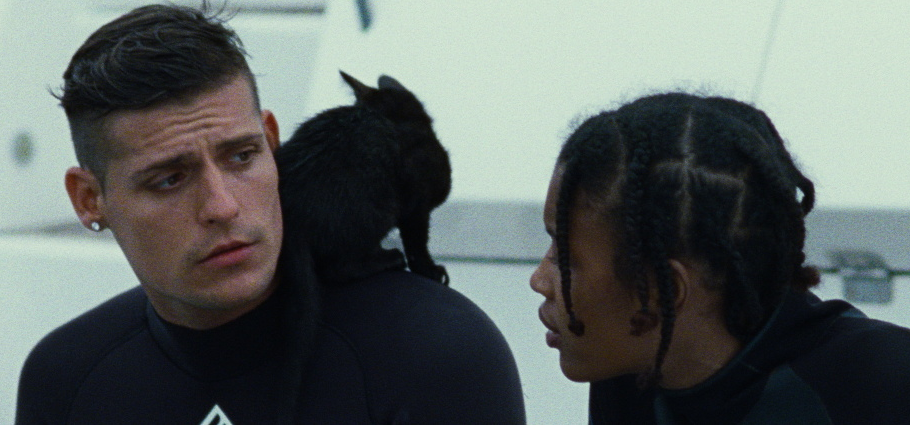
Murtada: What ideas did you want to push with this story?
DANIEL SCHMIDT: A lot. We worked on it for a few years. The initial ideas came maybe seven years ago, and they were building off previous film ideas. Gabriel and I have always been interested in films, especially from this sort of Hollywood language, Hollywood representation in entertainment. But our ideas don't really fit into the sort of allowances that, Hollywood would provide us. Our films are more playful or more subversive.
So we wanted to deal with popular forms, and we thought, what better way than a celebrity who has that intersection of all of these different cultural spheres. At first we wanted to look at the hypocrisies and exploitations done by celebrities. Like reality TV, Kim Kardashian or Donald Trump in the White House. Then we started shifting more towards looking at how a certain celebrity, one who is very naive and sort of ambiguous might be exploited by those things and his naiveté would have a distorting quality to the story. That was the general setting. Adoption and filial relationships and family relationships were always in the DNA of any kind of script that we wrote. The idea sharpened and one of the main turning points was a shifting the film towards being in Portugal and working with Carloto. (to Gabriel) I don't know if you want to speak to that.
GABRIEL ABRANTES: At a certain point we decided to shoot in Portugal. We had written various versions of the script and around the fourth or fifth rewrite I thought let's write something for Carloto Cotta. I'd worked with him three times before on shorts and he's hyper-inventive, a very interesting actor. We still wanted to do the same architecture as the script we had, which is about a very wealthy person that tries to justify their life politically by adopting somebody. We were thinking what sort of very wealthy icon will be interesting for Portugal and Carloto could play. Very quickly we came to the idea of this soccer stud, a Portuguese icon that could represent extreme wealth. We wrote right after Brexit and we shot during the election of Trump, Trump was elected during one of the shoot days. So we were writing and directing during the events that informed the film. It was almost live.
Did you change things as you went along since events were happening live?
GABRIEL: For sure. Especially our last rewrite was a huge one where a lot of things changed. The architecture, the skeleton is always the same but the surface really morphs. We wrote two months before shooting and kept changing it throughout the shoot. So we reacted a lot live.
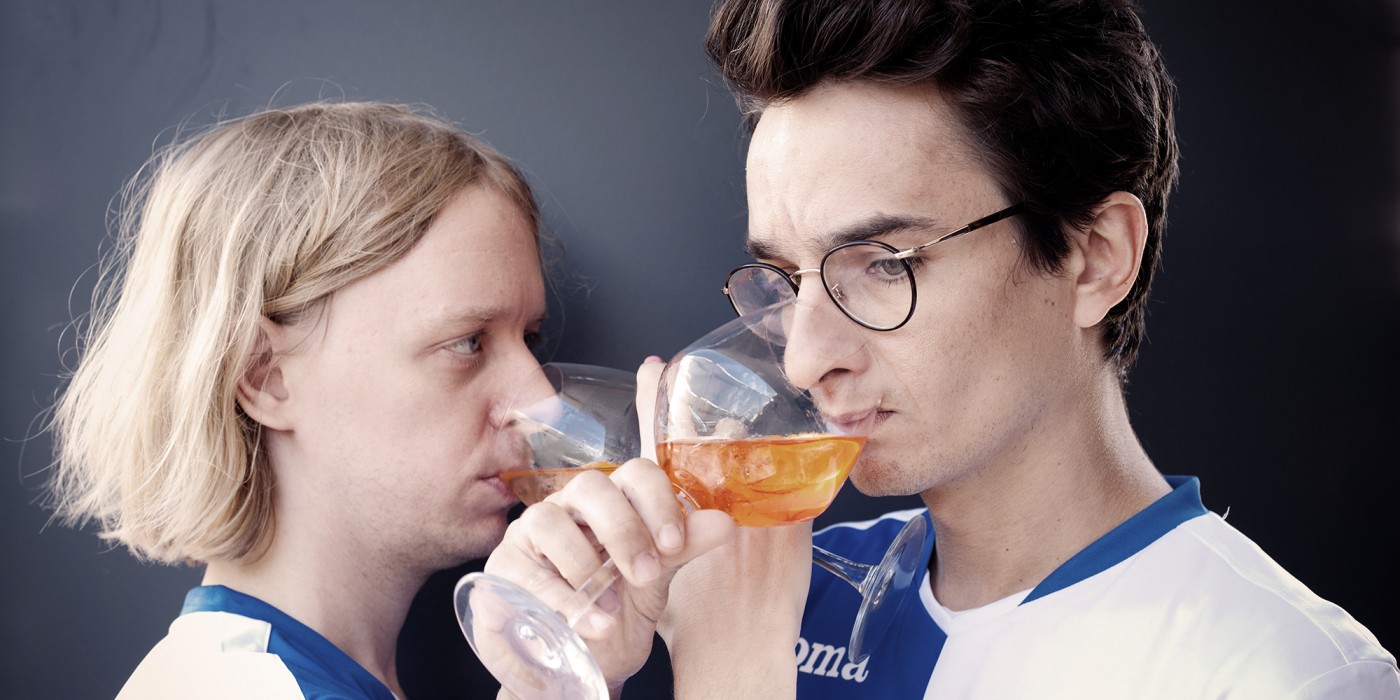 Schmidt and AbrantesHow do you work together? When writing, on set and post production? Are there things one of you is better at than the other?
Schmidt and AbrantesHow do you work together? When writing, on set and post production? Are there things one of you is better at than the other?
GABRIEL: Half and half. For example, when we started writing this film, we were in the north of Portugal. We were there for weeks and weeks, trying to figure out what we wanted to do and watching a bunch of movies. So our professional collaboration comes organically from our friendship. We're researching while we are watching movies, drinking, making dinner, going for walks, filming this other film. This whole process of germination of ideas happens naturally. So we watched all these romantic comedies and our friend in Lisbon gave us this book "The Hollywood Comedy of Remarriage" by Stanley Cavell. We both read it while we were starting to write the script.
Daniel showed me Au Hasard Balthazar which ended up influencing this film. And us watching each other watch these things helps build a conversation. Then when it gets right down to writing, one of us will pitch an idea, the other one will react to it. With this script, a lot of times when we were writing versions, we were a little late for a deadline and so we'd split scenes up.
DANIEL: Then we revise and switch and, and so yeah, sometimes we're right together speaking in unison. Other times we were separate, but working in tandem. It's very organic.
GABRIEL: It's not that Daniel's is the visual person, I'm the literary person or something. We are a team from the idea to color to whatever. We are in it together.
I was wondering about the different tones. There's satire, allegory, it's a rom-com. There's a lot of different things happening. It's a fantasy. Were you ever afraid people will be confused?
GABRIEL: I think we were very afraid, but that's also where we get most excited. When we feel like we're doing something that might be a little confusing or hard. We wanted to make something that could be open to a broader audience. Let's do something that is a bit complicated and a bit confusing and a bit ambiguous at times. But also something in a language that my friends, or my mom who has nothing to do with movies, would maybe want to watch. She can watch this rom-com and also get strange ideas about certain topics and subjectivities that she might not usually have access to. We touch on a lot of touchy stuff from gender to sexuality to politics and that's risky but also what we're most interested in.
DANIEL: We wanted to make a film that definitely touches on the real world. It doesn't shy away from that, which a lot of contemporary fantasies do. Or if they're allegories, they're in a safe remove like a castle for wizards or whatever. I love those movies but we wanted to map a sort of fairytale like language, which Hollywood has so forcefully blanketed the world, onto contemporary issues. We were also hoping that the film is something that can be open to interpretation, that it doesn't have a resolute idea or thesis. We have some ideas behind it of course. But we want the film to provide questions rather than answers, and we didn't want it to fully capitulate to the hegemony of realism, which is the main mode in which a lot of the subjects we touch are often treated.
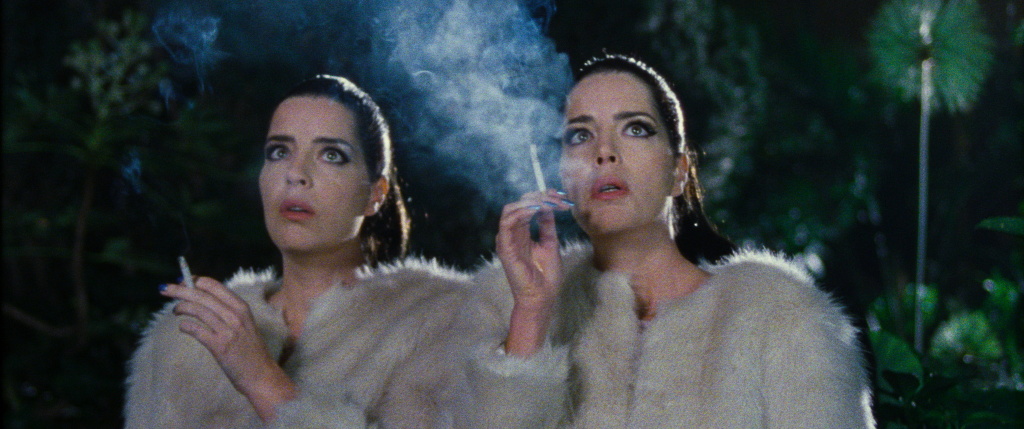
How did that work on set when working with the actors? For instance the actors who played the evil sisters have to be very hilarious and over the top while the romance has to be more grounded and believable.
GABRIEL: A lot of It is in the script and also we were really blown away by what the actors were doing. The sisters were not supposed to be twins. Then these twins came in for casting and were so funny. Maybe because they are sisters, they've grown up together. Their chemistry was through the roof. Some people think they're one note or too much but we love them. They were finishing each other's sentences. They spent a lot of time after rehearsal and after shoots fooling around together. They'd reorganize the script to their own rhythm, we were just amazed by what they did.
DANIEL: Cleo Tavares who plays Aisha and Carloto who plays Diamantino, they had somewhat of a classic approach. We filmed out of narrative sequence like most films, so we ended up filming their most tender scenes first scenes. That ended up giving them a degree of nervousness and tenderness that befit those scenes well. And then by the end of the film they're closer, they're more friendly. And that helped infuse the scenes where he's playing her father, her playing someone who's pretending to be his son. Other actors were hired to play one character but ended up playing a different one once we saw what they could do in rehearsals and their chemistry with each other. There was just a lot of responding to the actors. There was definitely a variety of acting modes or skills. This sort of things happens a bit more in Portugal, which is a smaller film economy than America, obviously. Actors worked in commercials, soap operas, theater, experimental theater, movies, etc. So they were happy to take on the different tones that the film traverses rather than being rigid in one style.
The lead character is so guileless and asexual at the beginning. I was wondering about your inspirations. It could be Dostoevsky’s "The Idiot" or Peter Sellers in Being There or even a recent film like Alice Rohrwacher’s Lazzaro Felice.
DANIEL:I thought that film really rhymed with our film. I saw it at Cannes. It's a very different film but I see the connection. Lazzaro is really amazing.
GABRIEL: But it was Baltazar as well. Big Inspiration. Forrest Gump was as well, I guess.
DANIEL: Candide is sort of the cornerstone.
GABRIEL: From Voltaire, yeah. And then this text by David Foster Wallace about Tracy Austin, the tennis player that he describes as depressingly vapid. He was expecting the secret to genius to be revealed. And then from beginning to end, she's only talking about the importance of family, how money never factored into her playing tennis or whatever. So his reading of her was also a big inspiration. Obviously also famous soccer players from Portugal. Lance Armstrong and his doping scandal. His interview on Oprah was a big inspiration.
DANIEL: These were all absolutely true inspirations, but I think the main thing is that Gabriel and I are often trying to twist or explode stereotypes. And so this idea of celebrities being operators who are using every single aspect of their platform to exploit things. And this is someone who's basically the inverse of that. He suspected of that but he's totally unaware and innocent.
Has Cristiano Ronaldo seen the film? (laugh)
GABRIEL: No idea.
DANIEL: Yeah. I don't know.
GABRIEL: We haven't been contacted yet.
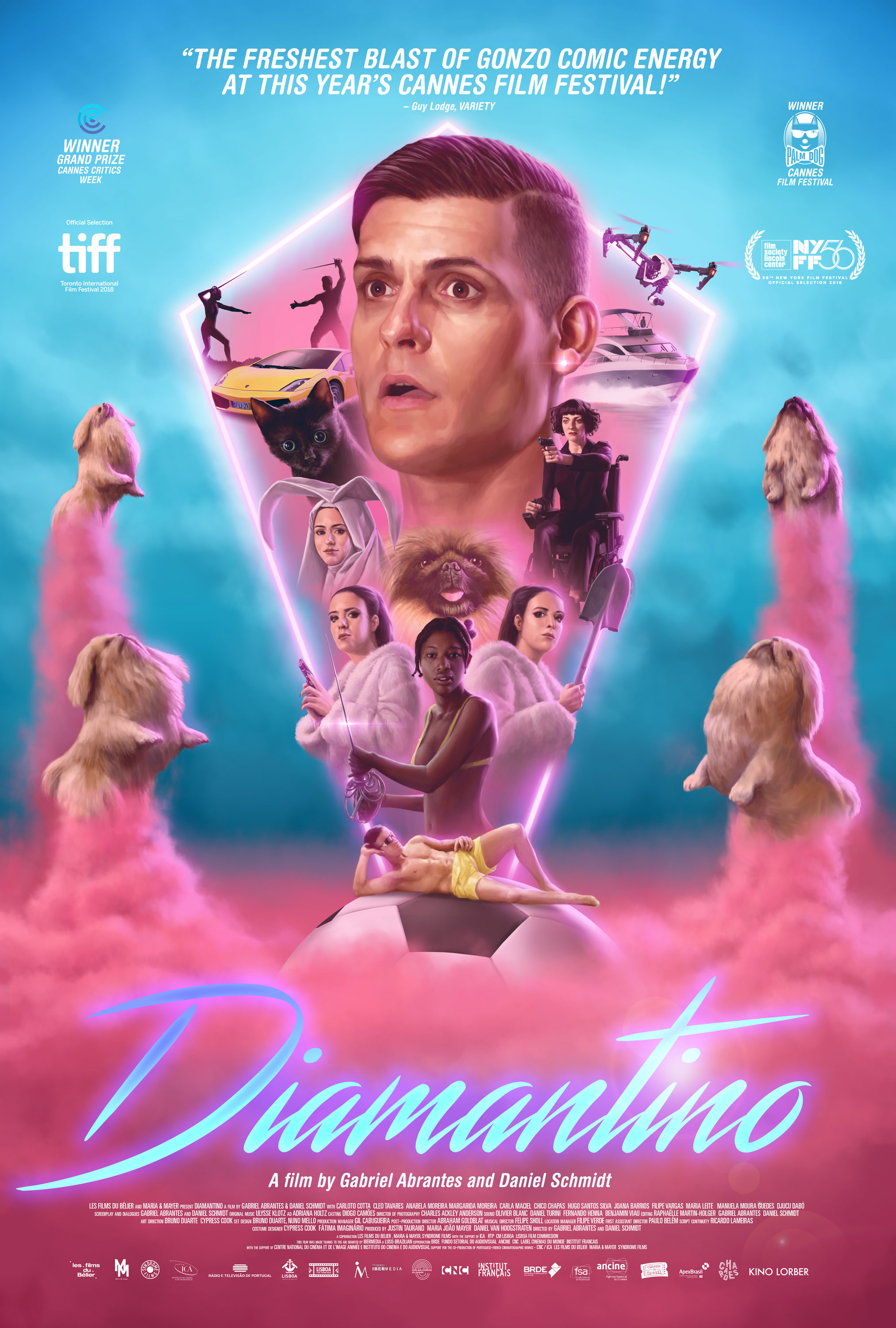
What about queer inspirations. The film has a queer sensibility. Some scenes were Almodovar-like.
GABRIEL: A big inspiration for a lot of the shorts I've done comes from Judith Butler’s idea about masquerade and how drag is a form of emancipatory mask. And that's why we were interested in crossdressing and gender bending which goes back to Shakespeare. In terms of film references, there's a little bit of Warhol but more of Kenneth Anger and what he does with traditionally hetero macho arch conservative stereotypes, like the homophobic motorcycle gangs in Scorpio Rising. Or Kustom Kar Kommandos. What I understand is most of these guys were Long Island hetero jocks and Kenneth Anger transformed them into queer icons. I always appreciated how he subverted these fascist characters against their will into these fantastical queer heroes. I thought that was really beautiful and perverse at the same time.
Cristiano Ronaldo is definitely fetishized by a lot of queer men. But he himself and for the majority of the world is seen as a massive hetero icon. And for us it was interesting to subvert that and play with that and deconstruct it. Also surprisingly make Diamantino the person who's most open to accepting that.
What about the big fluffy dogs? They were just such a memorable visual. Or the visual effects in general.
GABRIEL: They used to be piglets. We were lucky because we didn't ask for pekingese, but that's what the production brought. We were very charmed. They brought twelve of them because they get very tired. So you have to cycle them out. They had names like Betty who was the most active one. There was Queen Queen, there was Baucus. The trainer was fluffing them and hairdressing them and spraying them with Chanel No. 5.
How did you shoot those scenes?
DANIEL: The dogs we filmed in green screen and then put them against the filmed footage of, or soccer stadiums and the smoke which was generated by an effects house that we worked with. But I think in general, the takeaway for me with the effects was that we had set out a somewhat finite amount of effects. And then through working with that footage and the flexibility of having that green screen imagery we started to have the flexibility of being able to rewrite things at the end.
You talked about your collaboration, so are you intending to continue collaborating together? Or you don't know yet?
GABRIEL: We've made three films together and then Daniel made another two films with another director. I've done two films with another director and then we keep switching. I think we have a beautiful collaboration. We definitely enjoy working with each other a lot. Daniel has a saying, which is inspired by James Cameron saying that like he'll do Avatar 18 when the technology catches up and Daniel says that we will take a chance when the technology catches up.
DANIEL: I changed my saying to 'when they offer us Star Trek 9' or something (laughs).
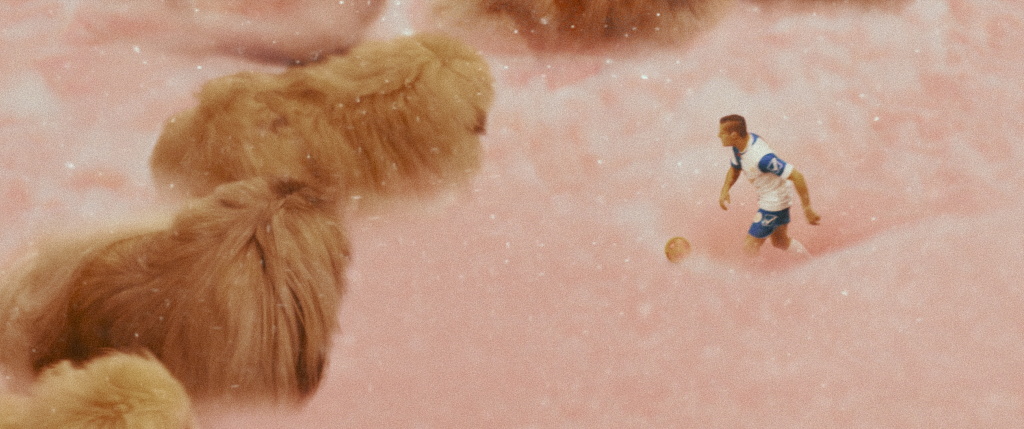
You said earlier that you were affected by current events. Do you think that artists have a responsibility to reflect society or to push forward socio political commentary in their art?
GABRIEL: No, but I think the art that I love most does. The question of responsibility is for me quite difficult because there are so many ways to attack what you should or shouldn't do. I had parents who worked in politics in a certain way and so I always mistrusted that approach towards the world. And I always thought art was actually a far more profound way to do philosophy and politics and I may be totally wrong about that. That might be a slightly bourgeois privileged perspective of the world. I've always been interested in trying to make films or paintings that engaged what's going on in the world in some way. I thought that was the best way to engage rather than starting a foundation or trying to work at it from a different angle.
DANIEL: Yeah, I agree with you that I think my favorite work engages with some sort of responsibility or attention to the world. However it all changes so much in the context of interpretation by audiences and critics and as times passes. I think nowadays I have a big interest in what we could call outsider art which might be coming from a space of not sort of knowing the larger world or the current discourse. But for Gabe and I who are privileged - anyone making movies has a privileged position. I think the responsibility is to be aware of that privilege. Bring aware of the history of cinema and how it has operated as an unwieldy force in cultural discourse. Where you go with that and where the audience takes the work is up to you as a critic and up to them.
GABRIEL: I think I responded poorly to the responsibility question. I think I'm old fashioned in a sense that the filmmakers that inspired me were the ones who advocated for a sort of irresponsibility. Like what I was saying about Anger or Warhol. They were masters of perversion, which for me was very liberating.
DANIEL: Or the To be Or Not to Be reference that you bring up, which is less irreverent....
GABRIEL: But it totally is. Making this goofy slapstick anti Nazi film during the war was just insane.
Diamantino is currently playing at Metrograph and BAM in New York. Here's a list of future dates in additional markets as well.



Reader Comments (4)
This movie is brilliant: one of my TOP 5 movies of the year so far!
Amazing film.
Pretty good...and funny.
Conan Osíris in Eurovision and now this movie. Portugal rocks!